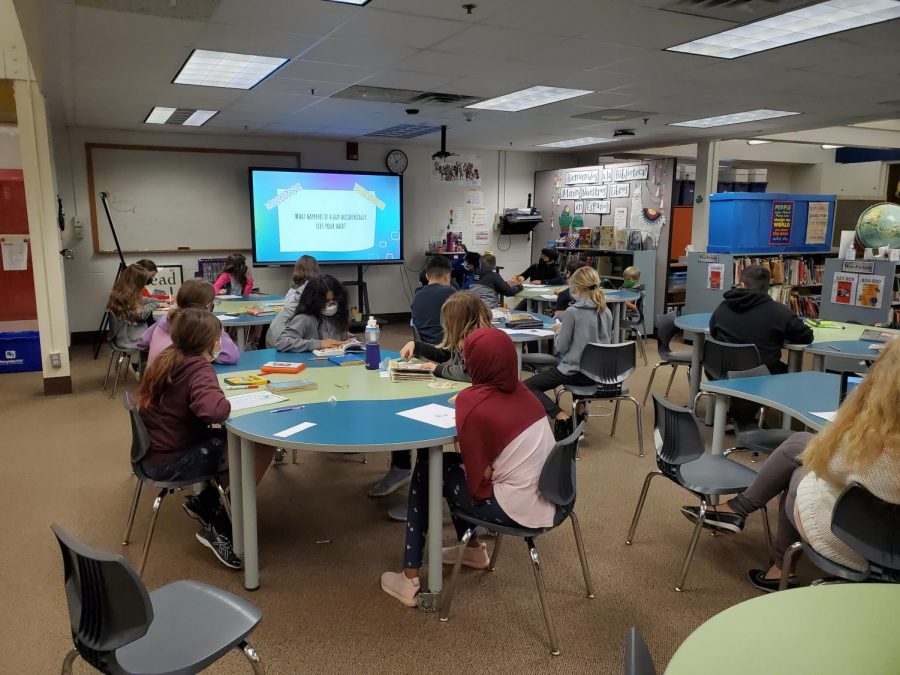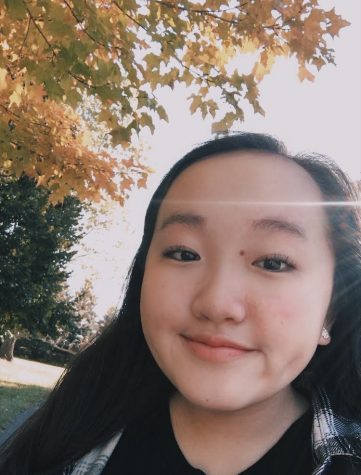Senior Shahd Abouhekel shares Muslim culture, representation in schools
Photo submitted by Shahd Abouhekel
Lake Elmo Elementary students gather in the media center to watch Shahd Abouhekel’s video. The students were able to learn about Muslim culture as well as interact with one another.
June 13, 2021
“It would have been amazing if we had different books portraying a variety of cultures and traditions. If I did have this experience like the elementary schoolers now, it would’ve opened up conversation about our identities and the students would’ve learned about the hijab and its true meaning at a younger age,” senior Shahd Abouhekel said.
Abouhekel got the opportunity to talk to elementary students virtually about her identity and culture to spread awareness about the hijab. She discussed the importance of representation in books, as well as her goal to see her culture represented in schools.
“The hijab is a part of my identity and I shouldn’t feel scared or embarrassed to show it off. I also felt hopeful for the next generation,” Abouhekel said.
After publishing the video, she was overwhelmed by the amount of love and support she received from the students, with many writing thank you letters to her. Many of them were curious and excited to see Abouhekel talk about her culture.
“The students made me thank you letters and Mrs. Thorager, an elementary school teacher dropped them outside my house. All the comments were so sweet and genuine,” Abouhekel explained.
As well as talking about her background and the hijab, she also discussed about Muslim characters in books, media, and how crucial it is to have positive representation. While growing up, Abouhekel felt as if there was not much representation in the films we watched or books we read. She also explained how if there were experiences where we could have conversations about identities and culture, it would change how we view other cultures and people’s backgrounds.
“There was not much Muslim representation in the books we read in school nor the films we watched. It would have been amazing if we had different books portraying a variety of cultures and traditions,” Abouhekel said.
Many films and books in media fail to measure Muslim representation on the screen and paper. A study shows that about nine in ten films that feature a Muslim character portray them negatively or stereotypically. And a data analyst, Shad Choudry created the Riz Test to assess the lack of representation of Islam on screen to see what kind of Muslim characters were depicted in these films.
The studies focused on characters talking about terrorism, being irrationally angry, and whether Muslim women are shown as oppressed.
Abouhekel expressed her concerns regarding the public’s view about Muslims and their culture. “The media plays a major role in portraying false accusations about Muslims. A popular stereotype about Muslims is that Muslim women are oppressed. Plenty of people think that women in Islam are forced to wear the hijab and that they have no choice. Others believe that it restricts their freedom. Having the misconception that the hijab is ‘oppressive’ portrays a negative image on the topic. For some, it represents dignity, honor, and strength. Why is a piece of fabric considered restrictive or oppressive?”
These stereotypes can harm Muslims and lead to misunderstandings about other people’s culture. But by bringing attention to the media and their depiction of Muslims as well as having multiple perspectives to learn from, can make see the importance in making a progressive shift for more inclusive figures of Muslims in the media.
“A way we can prevent ignorance and discrimination against Muslims is by staying open-minded. One can not judge a whole religion based on a group of individuals,” Abouhekel explained.
Although we can slowly start seeing change in how the media with Muslim representation, Abouhekel also wants to focus on having more representation in schools. She wants to help bring more of a safe environment for Muslim students and wishes for everyone to become more accepting with all our diverse backgrounds.
“The one takeaway I want students to understand is that although we are all different, we should still embrace who we are and accept each other,” Abouhekel added.












